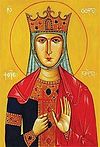

| Previous day | Next day |
| Old Style
September 13
|
Sunday |
New Style
September 26
|
| 14th Sunday after Pentecost. Sunday before the Exaltation of the Cross. Tone 5. | No fast.
|
![]() Commemoration of the Founding of the Church of the Resurrection (the Holy Sepulchre) at Jerusalem (335).
Commemoration of the Founding of the Church of the Resurrection (the Holy Sepulchre) at Jerusalem (335). ![]() Forefeast of the Exaltation of the Cross.
Forefeast of the Exaltation of the Cross. ![]() Hieromartyr Cornelius the Centurion (1st c.).
Hieromartyr Cornelius the Centurion (1st c.).
Martyrs Serapion, Cronides, and Leontius, of Alexandria (ca. 237). Martyr Straton of Nicomedia (3rd c.). Martyr Seleucus of Galatia (320). Martyrs Elias, Zoticus, Lucian, Valerian, Macrobius, and Gordian, at Tomis in Moesia (320). Great-martyr Ketevan, queen of Kakheti, Georgia (1624). St. Cornelius of Padan-Olonets, disciple of St. Alexander of Svir, and with him Sts. Dionysius and Misael (16th c).
St. Litorius, bishop of Tours (370). St. Eulogius I, patriarch of Alexandria (608). St. John of Prislop (Romania) (15th-16th c.). St. Hierotheus of Kalamata, monk of Iveron, Mt. Athos (1745).
Repose of Monk Dorotheus, last hermit of the Roslavl Forests (1866).
Thoughts for Each Day of the Year
According to the Daily Church Readings from the Word of God
By St. Theophan the Recluse

Fourteenth Sunday After Pentecost. [II Cor. 1:21-2:4; Matt. 22:1-14]
A king arranges a wedding for his son, he sends once for those who were bidden, sends twice, but because of earthly cares they do not come—one was busy at home, another with business. A new invitation was made in other spheres, and the wedding chamber was furnished with guests. Among them was found one not dressed for a wedding, who was therefore cast out. The meaning of this parable is clear: The wedding is the kingdom of heaven, the invitation is the preaching of the Gospels, those who refused are those who did not believe at all, and the one who was not dressed for a wedding believed, but did not live according to faith. Each of us must figure out for ourselves which category we belong to. That we are bidden is clear, but are we believers? Indeed it is possible to even be among believers, under their common name, and completely lack faith. One does not think at all about faith, as if it did not exist; another knows something or other about it and from it, and is satisfied; another interprets the faith in a distorted way; another relates to it with complete animosity. All are reckoned to be among the Christians, although they have absolutely nothing which is Christian. If you believe, figure out whether your feelings, or deeds conform to your faith—these are the garment of the soul, by which God sees you as dressed for the wedding or not. It is possible to know the faith well and be zealous for it, but in actual life to serve the passions, to dress, that is, in the shameful clothes of a sin-loving soul. Such people are one way in word, but are another way in the heart. On their tongue is, “Lord, Lord!” but within they are saying, “count me out.” (Examine yourself, whether you be in the faith and wearing the wedding clothes of the virtues, or wearing the shameful tatters of sins and passions.
Seventeenth Sunday After Pentecost. Sunday Before the Elevation of the Cross. [Gal. 6:11-18; John 3:13-17]
As Moses lifted up the serpent in the wilderness, even so must the Son of Man be lifted up: That whosoever believeth in Him should not perish, but have eternal life. Faith in the Son of God, crucified in the flesh for our sake—is the power of God unto salvation, the living source of vivifying moral aspirations and dispositions, and the receptacle of the abundant grace of the Holy Spirit which abides always in the heart, and of secret inspirations in good time, at the hour of need, sent from above. Faith combines one’s convictions, attracting God’s good will with power from above. Both of these are what make up the possession of eternal life. While this life is kept intact, a Christian is unyielding, because by cleaving to the Lord he is one in spirit with the Lord, and nothing can overcome the Lord. Why do people fall? From weakening of faith. Christian convictions weaken—and moral energy weakens as well. While this weakening occurs, grace is crowded out of the heart, and evil urges raise their head. An inclination toward these urges comes at a convenient hour, and there is a fall. Be a watchful guardian of the faith in everything it encompasses, and you will not fall. In this sense Saint John says that he who is born of God does not sin.
Articles
 Greatmartyr Ketevan the Queen of GeorgiaThe holy Queen Ketevan was the daughter of Ashotan Mukhran-Batoni, a prominent ruler from the Bagrationi royal family. |
 St John of PrislopSaint John was a monk of the Prislop Monastery in southwestern Romania at the turn of the sixteenth century. |







